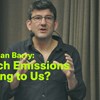inadequacy
Occupations in space: Using individual mobility patterns to reveal the latent dimensions of the occupational structure
Social Science Research, vol. 127 [Part of the Introduction] Recent studies on occupational structure and individual mobility suggest that the number of categories in the occupational structure vastly e
The fast and furtive spread of AI by infusion into technologies that we already in use – a critical assessment
In Hanemaayer, A. (editor) Artificial Intelligence and Its Discontents. Palgrave. Abstract AI has often reached individuals covertly, rather than by their own choosing. Standard automatic version update
Dark side of resilience: systemic unsustainability
Frontiers in Sustainability vol 4 Abstract Resilience is often presented as a championing solution for tackling the multi-level environmental, security, health, and financial threats facing the whole hum
Christian Barry: Which emissions belong to us?
Place:Holländargatan 13, Stockholm, or online.REGISTERAbstractTo address climate change we need to reduce net emissions globally. Most international processes and frameworks have involved seeking to g

Which emissions belong to us?
To address climate change we need to reduce net emissions globally. Most international processes and frameworks have involved seeking to get countries to make cuts to their emissions. Net zero has rec
Malcolm Fairbrother (presenter): How Much Do People Value Future Generations? (paper together with Gustaf Arrhenius, Krister Bykvist, Tim Campbell, webinar)
Malcolm Fairbrother is professor of sociology at Umeå University and researcher at the Institute for Futures Studies. In this seminar he presents the paper How Much Do People Value Future Generations? C
The Repugnant Conclusion: An Overview
In Stephen M. Gardiner (red), The Oxford Handbook of Intergenerational Justice, Oxford Academic. Abstract The repugnant conclusion can be formulated as follows: For any population consisting of people wi
Garrett Cullity: Offsetting and Risk-Aggregation
Garrett Cullity, Hughes Professor of Philosophy, School of Humanities, Faculty of Arts, The University of Adelaide, South Australia.Abstract When well-off individuals do not offset their own personal g
Completed: Valuing future lives
How should we value future lives when making decisions? This question is directly relevant to for example prioritisation in health care, population control, climate change, and existential risk (the survival of animal species and humanity).








